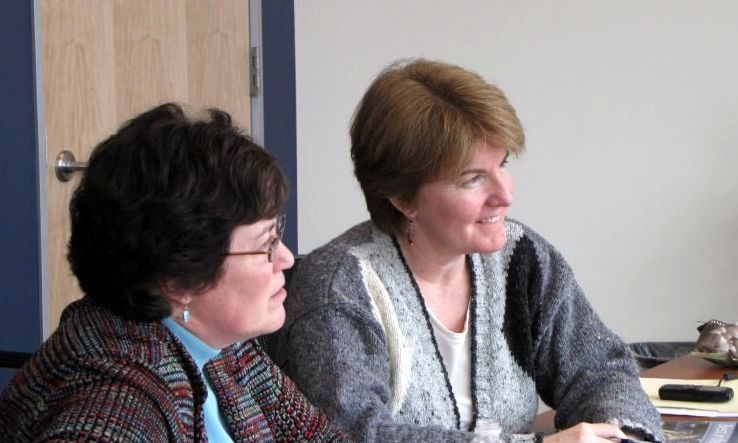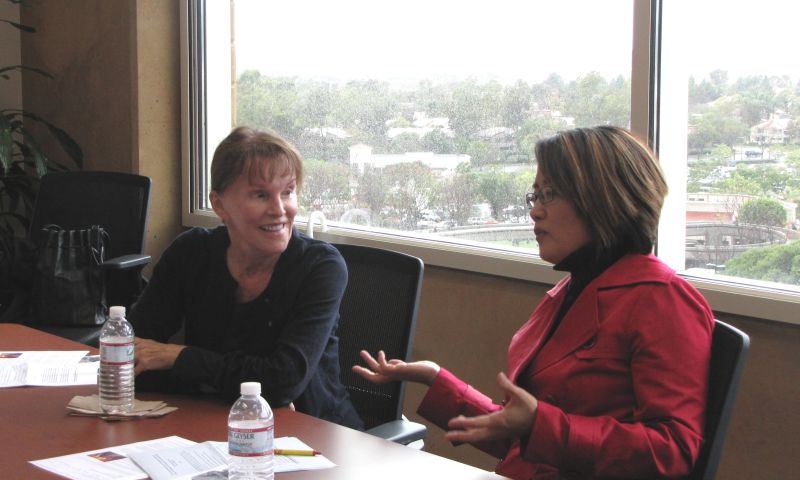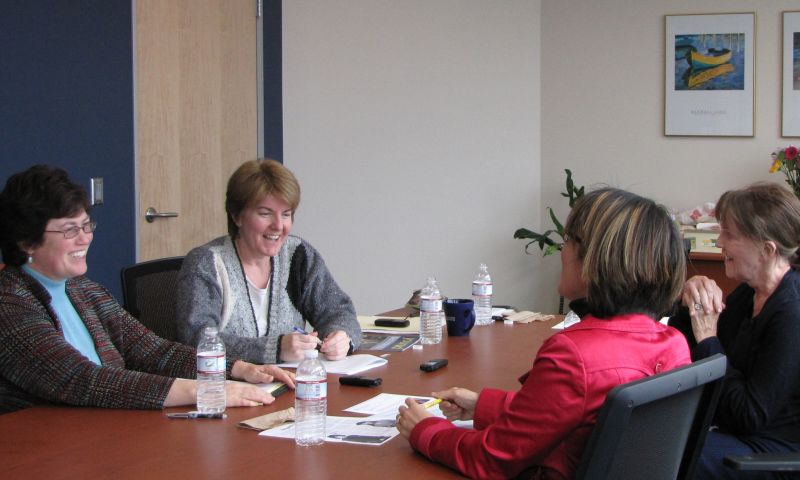Celebrating the passion, dedication and personal stories of Social Ecology faculty, staff, students, alumni and benefactors, “The Dean Asks…” is a feature in which Interim Dean Valerie Jenness interviews people inspired by the pursuit of excellence and encourages participation in interdisciplinary education to solve complex societal problems. Over the next year, please check back to read or listen to additional installments. View Archive
Martha Newkirk and Jenny Doh are both UCI alumnae, past Presidents of the UCI Alumni Association, and served on the UC Board of Regents together from 1990-91. Given their similar history of involvement with UC Irvine and after reading a joint interview (“Regents For A Year”, UCI Journal, 1991) about their UC Board of Regents experiences, Interim Dean Valerie Jenness and Associate Dean Karen Rook invited them to visit Social Ecology to offer their perspectives on the past, present, and future of UC Irvine.
Val: Let’s start by going back in time. How did you first meet and how has your relationship evolved over time?
Martha: We met through the UC Board of Regents. I remember this very young woman coming into this room of mostly men. We immediately connected and fortunately we came from the same campus.
Jenny: I am forever grateful to the UC Board of Regents for having introduced me to Martha Newkirk. When I entered into this new group of people, who were interested in preserving the welfare of the University of California, I sort of felt like the fish out of water. I was just an undergraduate student in a room full of elected Regents, faculty, chancellors, and alumni. I think what drew me to Martha was she did not brush me off and she had empathy for my situation, as did our Chancellor Jack Peltason. It gave me comfort knowing that I could sit next to Martha and it was safe to ask her questions and share ideas with her. Our relationship just grew from there.
Val: What is your most memorable moment serving on the Board of Regents?
Jenny: During my year we had tremendous fee increases for students and of course that issue is ever-green because we are going through it again today. I remember that I voted ‘no’ on the increase and I tried my best to bring the student perspective to the table during the process of the vote. Even though I knew that the vote would go the way it did, I felt it was my responsibility as the student Regent to shine some light on a different perspective. After the vote happened, I had a surprising experience. A sizable number of our student body suggested that I should resign because I could not prevent the fee increase. I remember thinking how unfair this feedback was, given the challenging role of the student regent, who only has one year to make an impact on such a deep rooted and complex matter as student fees.
Martha: It was one of those years similar to what we are going through now fiscally; the UC budget had been cut. Fees were a problem and we only had one year to make informed decisions. Like Jenny, I voted against the fee increases, but I knew they were inevitable. When I became a UC Regent, I chose one topic to learn in depth, which was the energy labs in Los Alamos, Livermore, and Berkeley. The labs were under great attack for mismanagement, which I think had some merit. So I pushed this cause and was relentless with it. Eventually they changed management and the change began during my year as a UC Regent.
 Val: Martha, did other Regents also take on your approach of learning about one issue in more depth or were they more generalists?
Val: Martha, did other Regents also take on your approach of learning about one issue in more depth or were they more generalists?
Martha: Most Regents were generalists, both appointed and alumni. But some were more focused on specific topics, such as the financial investments of the University.
Jenny: I think that for alumni Regents, a good strategy is to not be a generalist. Instead, it is best to pick one topic that you would like to shine the brightest light on and go for it.
Val: How did your core values shape how you approached being a Regent in 1990-91?
Jenny: One of my core values back then and today is courage. I do not like being afraid of issues that I find bothersome or unfair. When I joined the UC Board of Regents I armed myself with the notion that I would not be a coward in talking about important items. Another core value I had was compassion for students. Therefore, when I became a student Regent, my thought process was to shake things up and not be too intimidated to explain the students’ reality to others on the UC Board of Regents. I tried my best to be courageous and compassionate.
Martha: I value seeking the truth. The UC Regents were peppered with paperwork. I had so many documents to read, it was difficult to understand what was going on and find the underlying truth. At that time, the true decision makers were the President and his senior management staff. The political overlay also made it challenging to seek the truth.
Val: It's interesting that you say this; here we are at the University where we encourage people to seek the truth and in a way we are in the business of selling the truth because we believe it exists. But at the same time that political overlay often determines the outcomes. Here in the School of Social Ecology, you have invested in the Newkirk Center for Science and Society, which has a mission to bring science and facts to policy decisions. Therefore, in your own experiences, do these things matter or are they eclipsed by the political overlay?
Martha: Well, on the Board of Regents it was eclipsed. But I think you can seek and present the truth, like it is done at the University and hopefully the Newkirk Center, which I think is meeting this goal.
Karen: Let’s travel back a little further in time to when you were both students at UC Irvine. How did particular experiences or people impact or shape your life?
Jenny: I had a great student life at UC Irvine. I loved the student organizations and I spent a lot of time at the Cross Cultural Center. One thing that shaped me before coming to this campus was that I grew up in Bakersfield. When I landed in the United States in 1974 at seven years old, our family’s photo made the front page of the Bakersfield Californian with the headline “Korean Family Arrives.” We were plunged into a community with very few Asian Americans, so I did not grow up with any Korean American friends. In fact, the first Korean American friends I met were at UC Irvine. When I connected with others my age who also had immigrated to the United States, it was an awakening process for me. While a student in the School of Social Sciences, I interacted with great faculty like William Shonefeld, James Danziger and Mark Petracca. All of my professors were so embracing, supportive and truly engaged with students. They inspired critical thinking, questioning, and passionate dialogue. They gave me the spark and energy to become a good thinker and to not be afraid to be vulnerable or inquire.
Martha: I was considered a non-traditional student because I transferred to UCI Irvine and was a working mother. Fortunately, my husband was a teacher so he was able to do a lot of the child care when I was in school. The minute I stepped on campus I felt at home. I loved the protests going on campus and I remember going to sit-ins at the Chancellor’s office. These were things I had never done before. I also loved my professors, especially the gutsiness of Arnie Binder, who founded the School of Social Ecology. There are great stories about Arnie.
 Karen: Have experiences that might have seen uneventful at the time come to be more meaningful over time?
Karen: Have experiences that might have seen uneventful at the time come to be more meaningful over time?
Jenny: As a student, I did not understand the power of alumni. I never thought about alumni the first couple years of school and I certainly never had parents who encouraged me to connect with alumni. Now I am a part of the UCI alumni population and see all of the contributions that we make to the University and our local communities. I think our alumni have even greater potential to unleash if we harness our energy and become more engaged with the University.
Martha: When I was at UC Irvine, computers were half the size of this room! Therefore at the time, I did not project the information technology movement. Also, while studying in the School of Social Ecology, I mastered the principles of behavior modification. I still use these techniques today in my interactions with others and as a business leader.
Val: What are the current passions and activities that occupy your life?
Martha: My first passion is my family. I enjoy spending time with my grandchildren. Second, I love running a business. It is rewarding to see it succeed with my leadership. I am involved in a variety of community activities, but I like to keep a low profile. I enjoy being the power behind things getting done, but I do not like being the cheerleader.
Jenny: Martha and I have very similar passions and activities. I am married and have two children. My family is very important and is really the foundation of all things in my life. Also, after six years in magazine publishing I have taken a leap to be an entrepreneur by starting a new company called Creshendoh. It has been thrilling, a bit scary at times, and challenges me to think in new ways. Recently, I asked Martha if I was being too idealistic because I would like to run a company that allows me to be decent, generous with my staff, stakeholders and artists; yet still make a living. It was reassuring to hear from Martha, and other business leaders, that these values and principles will make me successful in the long term. This is great because I really do believe that in business, in family, and in life, valuing relationships—I like to say “not being a jerk”—is possible while still achieving your goals. If I can accomplish this, I would be extremely fulfilled.
Val: Are there particular individuals—perhaps historical or contemporary figures— who inspire you as you pursue the endeavors that matter most to you?
Jenny: I actually find the band U2 very inspiring because they have used their platform to try to do good. I am trying to do the same thing with my company, Crescendoh.
Martha: I am inspired by an eighty-eight year old woman and her husband, who are second or third cousins of my husband. They developed the United Farm Workers Association. They have always worked hard to make sure it stays together and have been dedicated to it for their entire lives.
Karen: What would you like to accomplish that you have yet to accomplish?
Jenny: I would like to make sure my kids grow up happy and are not menaces to society. I think they are well on their way. Also, I would like my business to be successful so that I can make a mark in that regard.
Martha: Unlike Jenny, at this point I am not going to start a new business. But I would like to expand my existing one. I have the same feeling as Jenny about family. My kids are adults, so my focus is helping my grandchildren be successful.
 Karen: What most pleases you about UCI’s trajectory to this point? And, what most concerns you about UCI’s trajectory?
Karen: What most pleases you about UCI’s trajectory to this point? And, what most concerns you about UCI’s trajectory?
Martha: My greatest concern is the budget. What is going to happen to the positive trajectory we have been experiencing in our programs, schools, and research centers? I think the recent budget cuts are going to have a huge impact on UC Irvine and unfortunately I do not think the cuts are over. When I was a UC Regent, we experienced economic pressures, but today it is much worse. So far, the recent fee increases have not deterred applications to UC Irvine. But I am very concerned about the student costs and I hope the quality of a UC Irvine education is not negatively affected by current and future cuts.
Jenny: I agree with Martha’s fiscal concerns and the need to maintain excellence. Another concern I have is creating true engagement with our alumni community. How should UC Irvine engage and receive support, including donations and personal involvement, from alumni? Nowadays, many people say technology can meet this challenge. I agree technology helps, but I think it comes back to the quality of the relationships established. To accomplish this, I first think dynamic and charismatic University leadership is essential. Second, it is important to create a warm and friendly community for students and then maintain these relationships after graduation. This concept sounds simple, but for some reason it is difficult to implement. I know it can work because my personal relationship with Martha is the reason I am participating in this interview today. I would do anything with or for Martha because of the relationship we have developed.
Martha: I agree with Jenny. Personal contact with alumni is extraordinarily important. I understand that we have many alumni and few people to reach out to them. But I think that University and alumni leaders can carry the message and engage larger groups.
Val: Clearly, all of us here today are committed to education. I often quote President John F. Kennedy, who said: “Let us think of education as the means of developing our greatest abilities, because in each of us there is a private hope and dream, which, fulfilled can be translated into benefit for everyone.” Kennedy summarizes the value of education as both an individual and a collective good. How do you describe the value of education?
Martha: For me, my education at UC Irvine taught me to think systematically and my mind was broadened. This has been very valuable in my life.
Jenny: When I think of education, the word opportunity comes to mind. Growing up, my parents always told me that an education created opportunities for you to be successful in life. I am passing this message on to my children today. Education creates opportunity for you to choose your path in life. This freedom is powerful.
Val: Jenny, when I asked you to participate in this interview, you immediately said “yes, if Martha is going to do it. I’d do anything with her or for her.” You also went on to say something about the two of you being called “Lucy and Ethel.” Can you explain that?
Jenny: I like to think of our friendship as a sort of Lucy and Ethel, because we laugh together or Martha makes me laugh with her good one liners. She cracks me up! The thing about Lucy and Ethel is they had great adventures, had fun, and I think it was a true down-to-earth friendship. Their friendship was based on trust and support, and I certainly experienced this from the moment I met Martha at my first UC Board of Regents meeting. There is nothing I would not do for someone like Martha, who showed me such kindness.
Martha: Yes, we have had a warm, honest, and easy relationship since our first meeting. Acts of kindness go a long way.